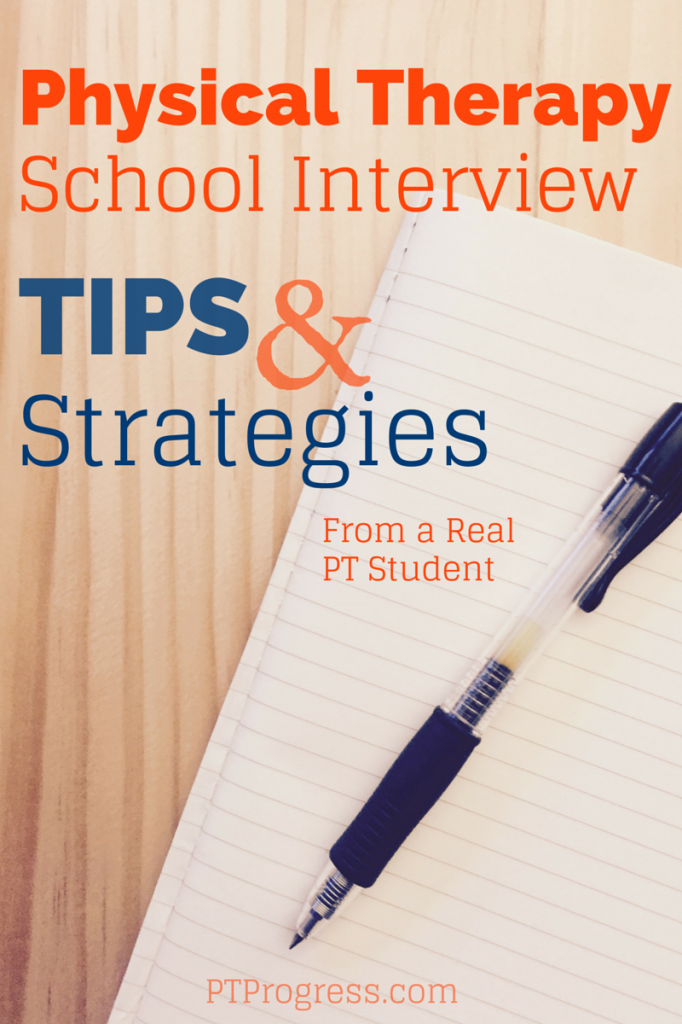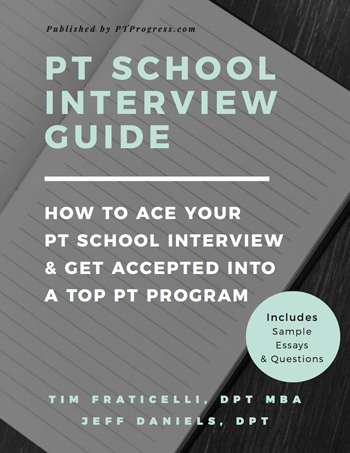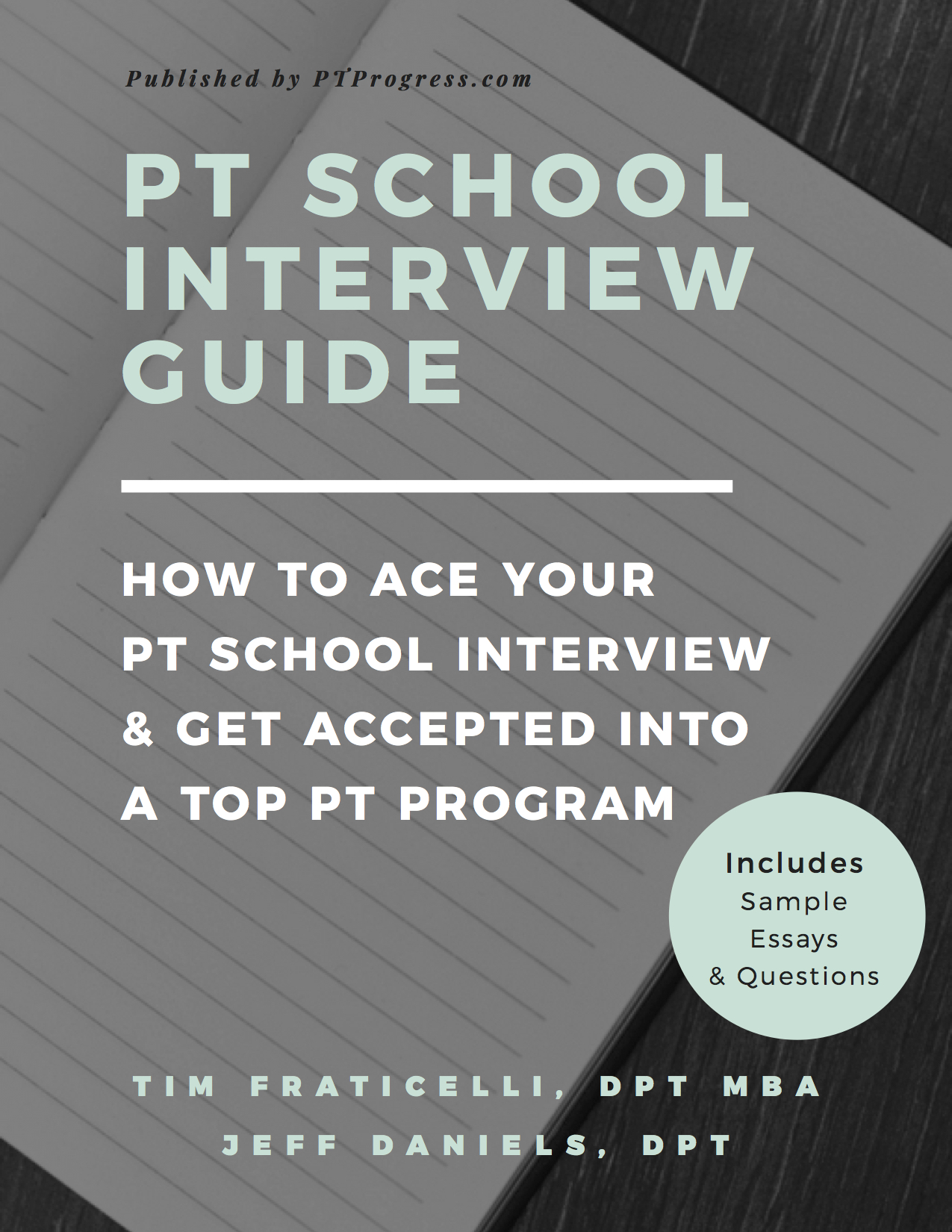
When you get an invitation to your first physical therapy school interview, you feel excited for about 10 minutes. Then, if you’re like most people, you start to freak out a little bit thinking about all the PT School interview questions they’re going to ask you!
(If you’re a PT looking for PT Job Interview Strategies, read this article: PT Job Interview Guide)
Don’t worry – that’s normal. That’s also why I put together this article with tips I learned from my PT school interview process.
***Note: This article is about 3,000 words of helpful advice. But we knew something was missing, so we created a guide that shares the exact strategies and ESSAYS we used to land a seat at the #1 PT School in the country. You can read that article here: The Physical Therapy School Interview Guide.
Definitely finish reading this article, but check out the Guide too 🙂 ***
Common Physical Therapy School Interview Questions
Every PT program is going to have their own spin on the interview process and questions they ask. Some programs will do group interviews with multiple students, while other programs pair a single student with a group of faculty members.
Most interview committees will start with a ‘Get to Know You’ set of questions. These are designed to draw answers about your background, so expect to hear a variation of the following.
Top 10 PT School Interview Questions:
1. Tell me about yourself.
- They’re not looking for your entire life story here. Keep it to the point.
- Never, ever, EVER, start with “My name is _________, I am ______ years old, and I was born in ____________.”
A better start is this:
“My name is _____________ and I attend the University of __________ majoring in ___________.
I enjoy being a part of a few groups/clubs at school, but outside of academics I enjoy ____(insert tasteful and interesting hobbies / activities)____.
Share your story to highlight strengths. Here’s mine:
“I come from a unique background having grown up in a small farming town where my family operated their own plumbing and electrical services business. I worked throughout high school and summers in college working alongside of my dad, making extra money to help pay my way through school.” (You can make almost any background sound unique and interesting if you’re honest and tie it to a reason why this makes you an interesting candidate.)
A quick background will share that you’re hardworking, independent, and self-motivating without even saying any of those ‘buzz words.’ You’re telling them through your story.
2. What Are Your Biggest Strengths?
They’re looking for character qualities here, so have a few stories in mind to give as an example. Don’t just say “Responsibility” or “Hardworking”.
Use others as ‘proof’ by starting with a version of a compliment that you’ve received from a former employer.
Here’s an example:
“I’ve always tried to make it a point to be the first one in and the last one out, especially when it comes to work and getting a task done. One of the most common points of feedback I get from employers is that I’m a reliable worker, so I’d put reliability towards the top of my biggest strengths list.”
Here you’ve given proof through an example that you are reliable and that others notice it. It’s one thing to say you are good at something, but it’s so much better when others say it about you, so be sure to share this type of example to back up your claim.
3. Why Did You Choose Physical Therapy?
Look around you. You’re surrounded by a dozen of other students who will probably all say some variation of this answer: “I want to help people.”
Bankers help people. Realtors help people. Nurses help people. My point: you need a more solid answer than I want to help people.
Yes, physical therapists help people. In fact, the APTA’s mission statement takes it even further:
Transforming society by optimizing movement to improve the human experience.
Physical Therapists are movement experts who help people regain the ability to live without pain and to return to doing the things they love. Without movement, our lives would be completely different and if you’ve spent any time in the clinic, you’ve seen how PTs impact the lives of their patients.
Your reason for choosing Physical Therapy as a career needs to stem far beyond the fact that it’s consistently listed in the top 10 most rewarding careers. You need to experience why it’s so rewarding.
The best way to do this is through shadowing a physical therapist. Clinical experience in a variety of settings (hospital, nursing facilities, orthopedics, pediatrics, etc.) will give you a wide range of stories to draw from and support the reason why you know that you want to be a physical therapist. We’ll discuss clinical experience later on in this article.
If you think this article was helpful,
Check out our Physical Therapy School Interview Guide.
4. Why Do You Want to Attend This Program?
I know what you’re thinking inside…I want to attend any program that accepts me! Fair enough, but you will need to have specific reasons to back up your answer.
- Devour the program’s website information.
- Know the history of the program and what makes them unique.
- Research the faculty and their specialties and articles they’ve published.
- Understand the student statistics (graduation rate, board pass rate, etc).
- Come prepared with specific questions that you were not able to answer with online research.
Talk With a Current Student or Graduate
If you really want to show that you’re interested, ask the admissions team if you can have the email of a current student. Most students are more than happy to share advice with prospects, so don’t be surprised if you actually reach a student! Be respectful of their time and ask specific questions.
You can also jump on LinkedIn and find a graduate of the program. Make a connection and send a quick message saying that you’re interested in the program they also attended and that you have an interview coming up. Ask if they would share any advice about the interview process or about specific aspects of the program they really enjoyed.
With your research complete, you can use this to back up your answer by saying that you’ve been communicating with graduates and current students (they may ask you who, so remember the graduate’s name!) and they’ve really spoken well about the program, especially (give an example).
Random Physical Therapy School Interview Questions You Might Hear:
5. Share 3 things that you learned about the person to your left. (group interview setting)
6. What was your favorite undergraduate class?
7. How do you handle stress?
8. Where do you see yourself in 5 years?
9. Explain how you’ve handled a conflict situation?
11. Why do you want to be a Physical Therapist?
10. Tell me about a time when you (popular start to behavioral interview questions)
Essay During Your Physical Therapy School Interview
During one of my interviews, there was a time set aside for the prospective students to write an essay. We had to write an essay in 1 hour answering this question: What was the best decision that you’ve made in your life so far.
Talk about philosophical.
The point to this exercise was threefold (in my opinion):
- Can you organize your thoughts in a well-written format?
- Can you support your claims with solid examples?
- Can you show us your creative side?
There’s a book that I absolutely love called To Sell is Human by Daniel Pink. The basic summary of the book is this: We’re all trying to persuade, negotiate, and pitch something regardless of the type of work we are in. (I’d highly recommend his book for inspiration on exercising your creative and improvisational side.)
If you have an arsenal of examples to support your claims and work to think of creative ways to present them, you’ll win over an audience. If you get an essay during your interview, channel your inner storyteller and captivate your audience with examples that highlight your creativity and character.
How to Stand Out When Answering PT School Interview Questions
Read any good books lately?
At every interview I attended, I was asked a variation of this question: What was the last book you read or found interesting? Every time!
Now I love reading and listening to books, so I had a few in mind. I’d recommend that before you go on your interview, have one or two books prepared (one fiction and one non-fiction) and remind yourself of the main idea and a few specific parts that really stood out.
If you really want to connect with what’s new in the field of Physical Therapy, check out the APTA’s News section on their website or follow their website MoveForwardPT to learn how PT impacts people every day.
Clinical Hours and Experience
Most programs require anywhere from 50 to 200+ shadowing hours. The more hours the better, especially if you can show that you’ve shadowed in a variety of settings.
This is one area that can really make you stand out as an applicant. Take diligent notes while shadowing and track the number of hours you spend in each different setting (orthopedics, pediatrics, neuro, home health, inpatient hospital, etc.).
Make notes about experiences that were challenging or that impacted your decision in the clinic. In one of my physical therapy interviews, I shared a story about working with a patient who experienced a terrible accident, leaving her unable to walk. For months she spent countless hours at PT, and despite the progress she made, she’d always need assistance for the rest of her life. I shared that particular story because it wasn’t glamorous. My point was to tell them how I understood that not everything in PT rehab is rainbows and lollipops. Sometimes our patients will respond great, while other times they may be angry, sad, frustrated, and in tears.
Spend time in the clinic. Talk with patients. Ask the physical therapist what they do, and why they decided PT versus other career options.
Undergrad GPA
Some programs have a minimum GPA for admissions, which can vary from 3.0 to 3.5 on a 4.0 scale. If you have a low GPA and didn’t do so great on your science prerequisites, be prepared to answer the questions about your grades. Fun fact: the average GPA for admitted PT students was 3.52 according to the PTCAS 2011-2012 data.
Here’s the key: don’t give excuses. A program will look more favorably on a student who had lower grades at the start of school and worked to raise them throughout his time in school. On the other hand, if you have a high GPA, but your last semester was a blow off the semester with multiple C’s, it might relay that you slacked off a bit – not a quality you want to display!
Did you struggle with a certain class – how did you resolve it? Tutoring? Self Study?
Did you change your major 3 times? Be ready to defend why you won’t change your mind about physical therapy.
Review your transcript and get ready to answer specific questions, but remember that GPA isn’t everything. However, if your science classes need to be improved, it wouldn’t hurt to retake a course to change that C to an A. If you have a free summer or an open class, show that you want to be challenged by taking an extra class like advanced exercise physiology, kinesiology, or even business management or economics.
GRE Score
It’s unlikely that they will ask you specific questions about your GRE. As long as you meet the minimum requirement, you’ll be fine. Just remember that if you have an average GPA and average GRE, there better be something about you that screams above average. If your GRE is below the average (and especially if it’s below the minimum), just retake the test. Spend a little money on a great GRE text (I recommend the Barron’s test prep. There’s a free version and a pro version that’s $100 that has a ton of sample questions and answers.
Final Tips For Getting into Physical Therapy School
Practice Out Loud
The best way to prepare for an interview is to rehearse what you plan on saying. Even if you don’t get the questions you practice, you’ll be rehearsing ways to organize your thoughts and real-life examples as you speak out your answers. You can’t practice enough! When you feel like you can answer questions well, try answering in front of someone – you’re going to have to do it eventually, so might as well practice with someone you know.
Don’t Say Anything Stupid
Ok, easier said than done. But seriously, don’t say anything of the following:
I decided to go to PT school after I tried getting into medical school. It seemed like a better fit. [This sounds like you’re using PT school as a backup – wrong answer.]
I don’t really have any weaknesses. Or. My biggest weakness is that I’m a perfectionist. [Let’s be real here – we’re all human and no one is so perfect as to have a weakness that makes them even better. Speak honestly and with humility, and avoid sounding overly confident to the point of conceited.]
Gather Your Thoughts
It’s OK to take a few seconds to gather your thoughts before you start to answer a question. Oftentimes interviews can feel conversational, but sometimes you might feel like they’re just asking random questions. If you feel like a question came from left field or you really want to answer it well, say this: “That’s a really good question. Let me gather my thoughts on that for a few seconds.”
Even if you don’t come up with a brilliant answer, this strategy does two things:
- Helps to prevent word vomit. The last thing you want is to spew out a ton of words that make no sense whatsoever.
- It shows them that you’re interested in giving a well-thought answer. Most people will respect you for taking some time to honestly think about it, especially if it’s a tough question.
If you think this article was helpful,
Check out our Physical Therapy School Interview Guide.
FAQ About Physical Therapy Admissions Process
Does it matter if my observation hours are paid or volunteer?
No, but it does matter that you spent time directly learning from an actual PT.
Will my experience as a massage therapist, yoga, or fitness instructor help me to get into PT school?
It won’t hurt and if you can show the value of bringing your perspective to the PT field, it’ll definitely help you in telling your story to the admissions team.
Will being a PT tech help me to get into PT school?
If you worked directly under a PT as a tech, that will give you an edge in terms of clinical experience. Now it’s your job to convince them that you used every day to learn from your PT and really took the time to go above and beyond to deliver great patient care (within your scope of practice of course).
I didn’t get into PT school. Should I go to PTA school first?
Nope, that’s not necessary. You don’t need to go to PTA school as a stepping stone to PT school. Work on improving your GPA, GRE, and clinical experience and apply again.
What is a competitive GRE score for PT school?
I’d recommend looking at the average GRE scores posted by school according to the PTCAS database. I averaged 150 for Verbal and 156 for Quantitative, which is about average for most programs. Remember, it’s an average, so there’s wide range of scores for admitted students.
What is a competitive GPA for PT school?
Most schools list a minimum GPA of 3.0 or higher. Reference the PTCAS database to see what the average GPA is for the schools you’re considering.
Do PT schools put greater emphasis on the verbal or quantitative part of the GRE?
As long as you are within normal limits or near the average, I don’t think it really matters. If one score is really high but the other is extremely low, you might want to retake the GRE to see if you can get an average (or above average) score for both.
How many physical therapy programs should I apply to?
The answer depends on a few factors: cost, location, and time. Do you have the funds to apply to each? Do they all require an interview – that’ll add up in travel costs. Will the interview times conflict with each other or with your school schedule. I applied to 4 programs, but I know of students who applied to over 20 programs.
What should you include in your personal statement?
Short version: Your most compelling story on why you are made to be a PT.
Do I need a degree in exercise physiology or kinesiology if I want to be a physical therapist?
Absolutely not. I have a degree in business administration and took the prerequisites to become a physical therapist after I graduated. You will have exercise physiology and kinesiology during your graduate PT studies, so it doesn’t hurt to take a few courses while you can. But you definitely don’t need to major a science field to better your chances.
What books are helpful to learn more about physical therapy?
The APTA’s main website and public website MoveForwardPT are great tools to keep you informed about all things PT. If you want to get a head start, many programs use: Kendall: Muscles, Differential Diagnosis for Physical Therapists, Neumann Kinesiology Text
I failed a class in undergrad. Can I still get into physical therapy school?
Sure, just be ready to answer questions about it during an interview. Prep for ways to show how you learned from it and improved as a student.
Should I try for an early decision PT program?
If you know without a doubt that you want to attend a certain program, the early decision route may be a good idea. It is a little risky, but again, if you are set on a program, it could be a good option for you.
Can I take physical therapy program prerequisites at a community college?
Many students (including myself!) took anatomy, physics, and biology at a community college. Always check with your prospective schools, but in general I would say that it is not uncommon to see prereqs from a community college.
What should I do if I’m put on the waiting list for a physical therapy program?
Aah, the dreaded waitlist. I know how you feel. Try contacting the school to get an idea of why they put you on the waitlist. They may just be waiting for you to finish a course. If that’s the case, send them your transcript as soon as it’s completed. They may also give great advice for you to boost your chances for the next application cycle if you don’t get selected this year.
Never lose hope! I know a few students in my program alone who were given a slot a month or two before the program started because someone decided not to attend!
Also, keep shadowing and look for ways to stand apart through leadership opportunities at your school or with a job. It doesn’t hurt to send the school a letter of intent with an update on what you’re doing to improve your experience and even knowledge through an additional class.
If you’ve made it this far, congratulations! I really wanted to create a thorough article to outline the interview process for PT school and answer as many questions as possible.
Are you applying to PT school this year? Connect with us in the comments and like PTProgress on Facebook!
*** Learn about our Newest Resource for PRE-PT Students ***
The Physical Therapy School Interview Guide
Click here to read the article explaining why we created the interview guide.
Get the PT School Interview Guide for $30 $16
Now $16

In one year, you will either be in PT School
or sitting in front of your computer reapplying.
What do you want to do?





My GRE score IS 141 on quantitative and 143 on verbal, which doesn’t meet the min requirement for the program I applied to; however, my Pre-req GPA is 3.75 and my overall GPA is 3.89. I’ve done 200 hrs of shadowing. What’s my chance of getting into the program?
I also took the GRE twice, but this score was the highest. I sent them both scores, and I’m not sure if that was even a good idea.
I have similar gre scores and will be applying to some pt schools with it. Did you ever get in with those scores?
Excellent tips. I wish I had these available to me before I started school.
My interview is this coming Thursday. This article was very beneficial in giving me an idea of what to expect and how to formulate my thoughts. Thank you! Have a blessed day!
How did your interview go Alex? Any tips?
It was really helpful. Thanks for taking the time out to write such an in dept article. I have an interview on Monday and will use the tips and advice given. Thanks once again. 🙂
Thank you for this.
Brilliant, thank you so much for all the thought you put into this.
Sandy did you end up getting in? if so where did you apply to?